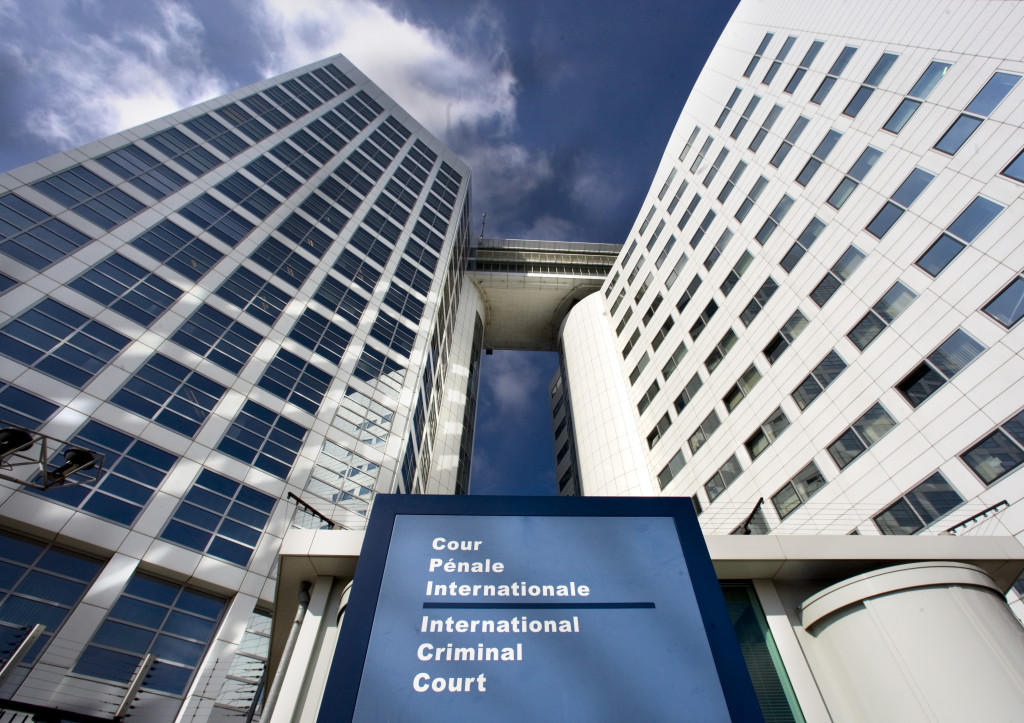Washington.- El presidente TRUMP planea asignar a Stephen A. FEINBERG, un multimillonario de Nueva York y persona de confianza del Presidente (actualmente miembro del Consejo Asesor Económico del Presidente), para liderar una amplia y profunda revisión de las agencias de inteligencia estadounidenses, según funcionarios de la administración. Una acción que los miembros de la comunidad de inteligencia temen que podría restringir su independencia y reducir el flujo de información; lo cual entra en conflicto con la cosmovisión del Presidente.
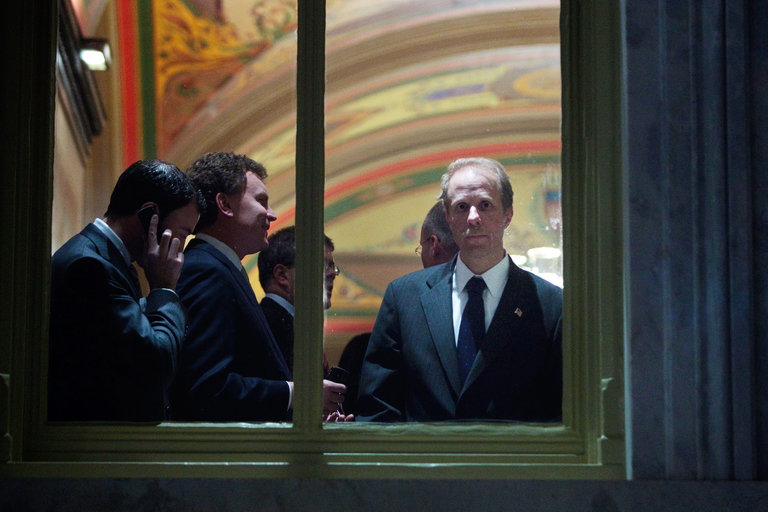
Stephen A. FEINBERG, a la derecha, fundador de Cerberus Capital Management, en el Capitolio en diciembre de 2008. Fuente: the New York Times.
El posible papel de Stephen A. FEINBERG, cofundador de Cerberus Capital Management, se ha enfrentado a una feroz resistencia entre los funcionarios de inteligencia tras las críticas que la comunidad de inteligencia ha recibido del Sr. TRUMP durante la campaña presidencial. Recientemente el Sr. TRUMP culpó a Michael T. FLYNN, su Consejero de Seguridad Nacional, por las fugas de la comunidad de inteligencia, episodio que culminó en la dimisión del Sr. FLYNN.
El Sr. FEINBERG, tiene estrechos vínculos con Stephen K. BANNON, Estratega Jefe del Sr. TRUMP y Jared KUSHNER, yerno del presidente. La Casa Blanca aún está trabajando en los detalles de la revisión de los cuerpos de inteligencia. Al tiempo, llevar al Sr. FEINBERG a Washington para desarrollar la revisión es visto como una forma de inyectar un personaje político leal a TRUMP en un micro-universo blindado; acción que la Casa Blanca ve con sospecha. Más aún, los altos funcionarios de inteligencia temen que el Sr. FEINBERG esté siendo preparado para un alto cargo dentro de una de las agencias de inteligencia. El Sr. FEINBERG carece de experiencia en el universo de la seguridad nacional y su mayor proximidad con estas espinosas cuestiones procede del control que actualmente tiene su empresa, Cerberus Capital, sobre dos fabricantes de armas y los jugosos contratos que ha cerrado con el Departamento de Estado.
A través de Cerberus, su compañía de capital privado, el Sr. FEINBERG tiene fuertes lazos con la industria contratante del Gobierno. Cerberus posee DynCorp International, que ha tenido un portfolio de sólidos contratos en el marco de la seguridad para el Departamento de Estado y otras agencias. De hecho, DynCorp está ahora focalizando acciones en una importante disputa legal por el cierre de un acuerdo legal del Departamento de Estado de 10 billones de dólares, que previamente servía como marco operativo para proporcionar apoyo aéreo para las operaciones antinarcóticos en el extranjero.
John F. KELLY, el nuevo Secretario de Seguridad Nacional, recibió USD 166.000 al año como consejero de DynCorp hasta ser integrado en el nuevo gobierno. Cerberus también es propietaria de Remington Outdoor, un importante fabricante de armas de fuego. En 2008, el Sr. FEINBERG también consideró invertir en Blackwater, la firma de seguridad fundada por Erik PRINCE, un ex miembro de los Navy SEALs, antes de que fuera finalmente adquirida por otros inversionistas.
El Sr. FEINBERG, tiene estrechos vínculos con Stephen K. BANNON, Estratega Jefe del Sr. TRUMP y Jared KUSHNER, yerno del presidente. La Casa Blanca aún está trabajando en los detalles de la revisión de los cuerpos de inteligencia. Al tiempo, llevar al Sr. FEINBERG a Washington para desarrollar la revisión es visto como una forma de inyectar un personaje político leal a TRUMP en un micro-universo blindado; acción que la Casa Blanca ve con sospecha. Más aún, los altos funcionarios de inteligencia temen que el Sr. FEINBERG esté siendo preparado para un alto cargo dentro de una de las agencias de inteligencia. El Sr. FEINBERG carece de experiencia en el universo de la seguridad nacional y su mayor proximidad con estas espinosas cuestiones procede del control que actualmente tiene su empresa, Cerberus Capital, sobre dos fabricantes de armas y los jugosos contratos que ha cerrado con el Departamento de Estado.
A través de Cerberus, su compañía de capital privado, el Sr. FEINBERG tiene fuertes lazos con la industria contratante del Gobierno. Cerberus posee DynCorp International, que ha tenido un portfolio de sólidos contratos en el marco de la seguridad para el Departamento de Estado y otras agencias. De hecho, DynCorp está ahora focalizando acciones en una importante disputa legal por el cierre de un acuerdo legal del Departamento de Estado de 10 billones de dólares, que previamente servía como marco operativo para proporcionar apoyo aéreo para las operaciones antinarcóticos en el extranjero.
John F. KELLY, el nuevo Secretario de Seguridad Nacional, recibió USD 166.000 al año como consejero de DynCorp hasta ser integrado en el nuevo gobierno. Cerberus también es propietaria de Remington Outdoor, un importante fabricante de armas de fuego. En 2008, el Sr. FEINBERG también consideró invertir en Blackwater, la firma de seguridad fundada por Erik PRINCE, un ex miembro de los Navy SEALs, antes de que fuera finalmente adquirida por otros inversionistas.
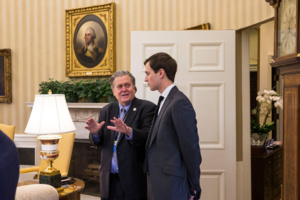
Stephen K. BANNON, estratega jefe del Presidente, y Jared KUSHNER, yerno de TRUMP, en la Oficina Oval en febrero 2017. Fuente: the New York Times.
En una serie de cuestiones -incluyendo el acuerdo nuclear de Irán, la utilidad de la OTAN y la mejor forma de combatir la militancia islámica- gran parte de la información y el análisis desarrollados por las agencias de inteligencia estadounidenses contradice las posiciones políticas de la nueva administración. El cisma es mayor cuando tratamos la geopolítica de Rusia y su Presidente Vladimir V. PUTIN, a quien el Sr. TRUMP ha elogiado repetidamente, mientras rechazaba los espinosos comentarios de inteligencia estadounidenses de que Moscú buscaba promover su propia candidatura.
En este contexto, el Sr. TRUMP ha nombrado a Mike POMPEO, ex congresista republicano de Kansas, para dirigir la CIA, y al ex senador Dan COATS, un republicano de Indiana, para ser el director de la Inteligencia Nacional (a fecha de hoy, pendiente de confirmación). Mientras que el rol potencial del Sr. FEINBERG en la Casa Blanca se sigue con intensa especulación entre los profesionales de la inteligencia; quienes temen que este último se postule para una posición poderosa dentro de la comunidad de inteligencia. Informes de que el Sr. FEINBERG estaba bajo consideración para ejecutar el servicio clandestino sacudió a la comunidad de inteligencia en las últimas semanas, elevando la contingencia de un control directo de Washington sobre la inteligencia norteamericana: en un momento precario en que los vínculos del Sr. TRUMP con PUTIN están siendo investigados por el FBI Y los comités del Congreso. En este agitado marco, la hipótesis de que el Sr. FEINBERG pueda liderar una revisión de las agencias de inteligencia, contratado por la Casa Blanca, ha suscitado lógicas preocupaciones en la comunidad de inteligencia.
El Sr. COATS está especialmente alterado con lo que él ve como un movimiento por el Sr. BANNON y el Sr. KUSHNER para dejarlo fuera antes de que incluso se confirme su puesto. Él cree que la revisión afectaría a una parte central de su papel como el director de la Inteligencia Nacional (IN) y teme que si el Sr. FEINBERG trabajara en la Casa Blanca, podría convertirse de forma ágil en la ‘voz dominante’ en asuntos de inteligencia. El reto es menos inmediato para el Sr. POMPEO, quien no percibe como una necesidad urgente ejecutar una purga de la comunidad de inteligencia, pero entiende que se trata de una acción más efectivista que el nombramiento de un profesional ajeno a las operaciones diarias de inteligencia, como es el caso del Sr. FEINBERG, quien desempeñaría un proyecto con autoridad real sobre la IN.
En este contexto, el Sr. TRUMP ha nombrado a Mike POMPEO, ex congresista republicano de Kansas, para dirigir la CIA, y al ex senador Dan COATS, un republicano de Indiana, para ser el director de la Inteligencia Nacional (a fecha de hoy, pendiente de confirmación). Mientras que el rol potencial del Sr. FEINBERG en la Casa Blanca se sigue con intensa especulación entre los profesionales de la inteligencia; quienes temen que este último se postule para una posición poderosa dentro de la comunidad de inteligencia. Informes de que el Sr. FEINBERG estaba bajo consideración para ejecutar el servicio clandestino sacudió a la comunidad de inteligencia en las últimas semanas, elevando la contingencia de un control directo de Washington sobre la inteligencia norteamericana: en un momento precario en que los vínculos del Sr. TRUMP con PUTIN están siendo investigados por el FBI Y los comités del Congreso. En este agitado marco, la hipótesis de que el Sr. FEINBERG pueda liderar una revisión de las agencias de inteligencia, contratado por la Casa Blanca, ha suscitado lógicas preocupaciones en la comunidad de inteligencia.
El Sr. COATS está especialmente alterado con lo que él ve como un movimiento por el Sr. BANNON y el Sr. KUSHNER para dejarlo fuera antes de que incluso se confirme su puesto. Él cree que la revisión afectaría a una parte central de su papel como el director de la Inteligencia Nacional (IN) y teme que si el Sr. FEINBERG trabajara en la Casa Blanca, podría convertirse de forma ágil en la ‘voz dominante’ en asuntos de inteligencia. El reto es menos inmediato para el Sr. POMPEO, quien no percibe como una necesidad urgente ejecutar una purga de la comunidad de inteligencia, pero entiende que se trata de una acción más efectivista que el nombramiento de un profesional ajeno a las operaciones diarias de inteligencia, como es el caso del Sr. FEINBERG, quien desempeñaría un proyecto con autoridad real sobre la IN.
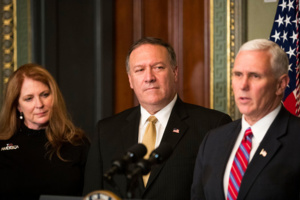
Mike POMPEO, centro, en el acto de toma de Oficina y juramento como Director de la CIA en enero 2017. Evento dirigido por el Vicepresidente Mike PENCE. Fuente: the New York Times.
Numerosos funcionarios de inteligencia se preguntan qué propósito serviría una revisión de la inteligencia de la Casa Blanca, además de posicionar al Sr. FEINBERG para un papel más estratégico en un futuro a corto plazo. Como destaca el diario the New York Times y la CNN, los cambios más significativos a implementar en la comunidad de inteligencia requerirían un acto del Congreso. Hecho que, en última instancia, se opondría a cualquier idea o propuesta que el Sr. FEINBERG presentara. Incluso con una mayoría republicana en ambas cámaras, parece poco probable que el Congreso acepte cambios relevantes en cualquiera de las agencias de inteligencia.
Las tensiones entre la comunidad de inteligencia y la Casa Blanca ya están escalando una crisis en varios frentes. Antes de que el Sr. FLYNN fuera expulsado, Robin TOWNLEY, una de sus principales ayudantes, fue negada una autorización de seguridad (security clearance) por la CIA. Más aún, la desconfianza sobre la comunidad de inteligencia se ha estado construyendo durante años en los círculos políticos conservadores, durante el gobierno de Obama, cuando agencias como la CIA fue vista como una entidad excesivamente politizada.
El político republicano por el Estado de Iowa, Steve KING, comentaba recientemente en una entrevista que “muchos funcionarios de la comunidad de inteligencia contaban con credibilidad, pero no todos". "Hay funcionarios que deben ser extirpados", apuntaba King. Otro legislador republicano avanzaba que la opinión predominante en la Casa Blanca es también que las agencias de inteligencia en EEUU estaban faltas de una 'criba purgativa'.
Una vez más, en su breve mandato, parece que TRUMP destaca más por generar discordia y conflictos que por evitar una crisis potencial. Este caso no está siendo una excepción, pese a que ahora el objeto de sus cóleras impulsivas podría convertirse en su propio ‘Caballo de Troya’.
Las tensiones entre la comunidad de inteligencia y la Casa Blanca ya están escalando una crisis en varios frentes. Antes de que el Sr. FLYNN fuera expulsado, Robin TOWNLEY, una de sus principales ayudantes, fue negada una autorización de seguridad (security clearance) por la CIA. Más aún, la desconfianza sobre la comunidad de inteligencia se ha estado construyendo durante años en los círculos políticos conservadores, durante el gobierno de Obama, cuando agencias como la CIA fue vista como una entidad excesivamente politizada.
El político republicano por el Estado de Iowa, Steve KING, comentaba recientemente en una entrevista que “muchos funcionarios de la comunidad de inteligencia contaban con credibilidad, pero no todos". "Hay funcionarios que deben ser extirpados", apuntaba King. Otro legislador republicano avanzaba que la opinión predominante en la Casa Blanca es también que las agencias de inteligencia en EEUU estaban faltas de una 'criba purgativa'.
Una vez más, en su breve mandato, parece que TRUMP destaca más por generar discordia y conflictos que por evitar una crisis potencial. Este caso no está siendo una excepción, pese a que ahora el objeto de sus cóleras impulsivas podría convertirse en su propio ‘Caballo de Troya’.
Tags :
Dan COATS
Donald TRUMP
el FBI
Inteligencia Nacional de Estados Unidos
la CIA
Mike POMPEO
Stephen A. FEINBERG
Vladimir V. PUTIN
Posted by Christopher O. DE ANDRES, on Saturday, February 18th 2017 at 08:07
|
Comments (0)
We must consider reasonable to confirm that ICC is Africa's 'most credible court of last resort', as expressed by Mr. Kofi ANNAN.
About the Court: The International Criminal Court (ICC) opened in July 2002, located in The Hague, is the Court of last resort for prosecution of genocide, war crimes, and crimes against humanity. It is the first legal body with permanent international jurisdiction to prosecute genocide, crimes against humanity and war crimes.
Its founding treaty, the Rome Statute, entered into force on July 1st, 2002. Over the last decade this Court has made significant headway in putting international justice on the map. Now, while the ICC is now responsible for international criminal accountability, its daunting mandate and world-wide reach have made its flaws more visible. The court and its member 124 State Parties to the Rome Statute face major challenges in meeting expanded expectations for the court across its current second phase - until 2020.
Its founding treaty, the Rome Statute, entered into force on July 1st, 2002. Over the last decade this Court has made significant headway in putting international justice on the map. Now, while the ICC is now responsible for international criminal accountability, its daunting mandate and world-wide reach have made its flaws more visible. The court and its member 124 State Parties to the Rome Statute face major challenges in meeting expanded expectations for the court across its current second phase - until 2020.
Synopsis of the conflict: During the last few weeks six (6) African countries have complained that the International Criminal Court (ICC) is pursuing an aggressive and disruptive agenda in Africa, without proper priorities - particularly Burundi; Gambia; South Africa; Sudan; and Uganda – listed in alphabetical order. Kenya belongs to a separate scenario: it was the only case in Africa opened independently by the Court. But the ICC enjoyed the enthusiastic support of a majority of Kenyans. ‘They wanted justice for the 1,300 people killed and hundreds of thousands displaced in election-related violence’.
In this same critical framework, Burundian lawmaker said the ICC was “a political tool used by powers to remove whoever they want from power on the African continent.” The ICC had in April 2016 served notice that it would investigate outbreaks of violence in Burundi, which has been mired in a political crisis for more than a year. This position is echoed by the Gambia’s decision to quit the international institution and the government accuses the Court of targeting African leaders. On the part of South Africa, they said the Court’s summons were impeding their efforts at hosting peace talks. Simultaneously, in the short run ICC pressure on Sudan to hand over two alleged criminals has had no discernible impact, largely because relations between Khartoum and major Western governments have collapsed within the last months. However, we must keep in mind ICC prosecution represents one of the few credible threats to human rights violators in countries like Sudan, and can continue to be so if it secures convictions.
In the context of Uganda there is a conflict between the Ugandan government and the Lord’s Resistance Army, while ICC arrest warrants seems to have played a role in bringing both sides together for peace negotiations. Some criticisms outline the undermining of the Court’s legitimacy in the DRC and Uganda. In the DRC, where massive rights violations have occurred, a few arrests by the ICC of senior personnel carry mostly symbolic value. Nevertheless, the Court’s approach to selecting cases, follows the Rome Statute’s definition of complementarity, following a spirit of exclusively acting when States do not or cannot act for political, geopolitical or tactical reasons. In this same line of thought, the ICC got involved in these African cases because national authorities did not conduct solid investigations into the massive crimes that had occurred while the ICC does not supplant national jurisdictions, it only intervenes in cases where the country concerned is either unable or unwilling to try its own citizens. Africans deserve justice as much as anyone else, even if their governments cannot always provide it.
In this same critical framework, Burundian lawmaker said the ICC was “a political tool used by powers to remove whoever they want from power on the African continent.” The ICC had in April 2016 served notice that it would investigate outbreaks of violence in Burundi, which has been mired in a political crisis for more than a year. This position is echoed by the Gambia’s decision to quit the international institution and the government accuses the Court of targeting African leaders. On the part of South Africa, they said the Court’s summons were impeding their efforts at hosting peace talks. Simultaneously, in the short run ICC pressure on Sudan to hand over two alleged criminals has had no discernible impact, largely because relations between Khartoum and major Western governments have collapsed within the last months. However, we must keep in mind ICC prosecution represents one of the few credible threats to human rights violators in countries like Sudan, and can continue to be so if it secures convictions.
In the context of Uganda there is a conflict between the Ugandan government and the Lord’s Resistance Army, while ICC arrest warrants seems to have played a role in bringing both sides together for peace negotiations. Some criticisms outline the undermining of the Court’s legitimacy in the DRC and Uganda. In the DRC, where massive rights violations have occurred, a few arrests by the ICC of senior personnel carry mostly symbolic value. Nevertheless, the Court’s approach to selecting cases, follows the Rome Statute’s definition of complementarity, following a spirit of exclusively acting when States do not or cannot act for political, geopolitical or tactical reasons. In this same line of thought, the ICC got involved in these African cases because national authorities did not conduct solid investigations into the massive crimes that had occurred while the ICC does not supplant national jurisdictions, it only intervenes in cases where the country concerned is either unable or unwilling to try its own citizens. Africans deserve justice as much as anyone else, even if their governments cannot always provide it.
The fact that much of the ICC’s work has taken place in Africa highlights some of the controversial issues facing the Court, raising the question of whether international justice is evenly and fairly applied around the globe. The Court’s operations have expanded and deepened during this same period – new investigations, arrest warrants and preparations for trial all testify to any doubts. Current operations are translating the ICC’s ideals into reality and setting vital precedents for the Court’s future activities. Furthermore, we noted that contrary to claims in the context it was targeting Africa, the ICC had opened investigations in Georgia and was concluding preliminary probes in Afghanistan, Colombia, Irak, Palestine, and Ukraine.
Complementary, former United Nations Secretary General, Mr. Kofi ANNAN, has recently expressed that this Court is an institution that has and rightfully deserves the support of Africa because it "remains the continent’s most credible Court of last resort for the most serious crimes." In a recent article written for the UK-based publication ‘The Guardian,’ Mr. ANNAN, who is a strong advocate for the Court -opinion we share in this media platform by all means-, said despite its imperfections, the ICC had the support of the people of Africa, particularly the victims of war crimes and crimes against humanity.
‘‘Most of the continent’s democratic governments stand by the ICC. I stand by the ICC, because the most heinous crimes must not go unpunished,” he said.
Complementary, former United Nations Secretary General, Mr. Kofi ANNAN, has recently expressed that this Court is an institution that has and rightfully deserves the support of Africa because it "remains the continent’s most credible Court of last resort for the most serious crimes." In a recent article written for the UK-based publication ‘The Guardian,’ Mr. ANNAN, who is a strong advocate for the Court -opinion we share in this media platform by all means-, said despite its imperfections, the ICC had the support of the people of Africa, particularly the victims of war crimes and crimes against humanity.
‘‘Most of the continent’s democratic governments stand by the ICC. I stand by the ICC, because the most heinous crimes must not go unpunished,” he said.
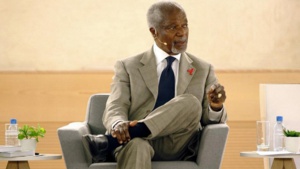
Former United Nations Secretary General, Mr. Kofi ANNAN during a recent interview on this issue. Source: Mr. ALFA SHABAN, African News, 18.11.2016
Mr. ANNAN said as the continental bloc with the largest representation in the ICC – 34 State parties out of 124, Africa has benefitted and continues to leverage its human rights and legal status in the justice context meted out by the Court. Among others points to support his claim. Out of nine investigations on the African continent, eight were requested by African states themselves. Six African states referred their own situation to the ICC. African states voted in support of the UN Security Council referrals on Darfur and Libya. He, however, bemoaned some technical gaps of the Court, among others the fact that only two (France and the United Kingdom) out of the five Permanent Members of the UN Security Council, were signatories to the court.
This publication also agrees with Mr. ANNAN in the component of addressing the possible shortcomings while supporting the ICC’s efforts to rectify them, not to quit the Court; one of the most significant achievements of international society since the end of the cold war.
"Africa wants this court. Africa needs this court. Africa should continue to support this court. This is why I call on Africa’s democratic governments to take a principled stand in the near future at the Assembly of States Parties meeting in The Hague to shore up the ICC, a historic milestone on humanity’s journey towards international justice," concluded Mr. ANNAN.
This publication also agrees with Mr. ANNAN in the component of addressing the possible shortcomings while supporting the ICC’s efforts to rectify them, not to quit the Court; one of the most significant achievements of international society since the end of the cold war.
"Africa wants this court. Africa needs this court. Africa should continue to support this court. This is why I call on Africa’s democratic governments to take a principled stand in the near future at the Assembly of States Parties meeting in The Hague to shore up the ICC, a historic milestone on humanity’s journey towards international justice," concluded Mr. ANNAN.
note - some EU reputable publications mention another four (4) countries considering their relationship with ICC: Central African Republic; Cote d'Ivoire; Chad; and DR Congo. Kindly check El País (Spanish version, date 26.10.2016).
Posted by Editor in Chief: Mr. Christopher O. DE ANDRES, on Monday, November 21st 2016 at 07:15
|
Comments (0)
Category
Recent posts
Archives
#Team Management #Gestión de Equipo International Business Development #Gestión de Equipo Comercial
5 MISSION AREAS IN HORIZON EUROPE
Acceso universal al tratamiento del sida
ACNUR
actor Pepe Sancho
ADHESIÓN DE CROACIA A LA UE
advertising / teleshopping spots
Africa
Alianza Atlántica
Alianza del Pacífico
Alibaba
Alibaba Group Holding Ltd.
AlipayApp
Amnistía Internacional
Ana Pastor
AnálisisyGestiónInteligenteDeDatos
Angela Merkel
Banco Central Europeo (BCE)
Banco Mundial
Barack Obama
batalla del sector del taxi y VTC
Benjamin Franklin
Bill Gates
binomio chavismo / antichavismo
Blockchain opportunities in international public health care sector
Blockchain technologies in health care
Blog Posts
Boris Johnson
Brexit
BUILDING THE CITIES OF THE FUTURE
China
Comisión Europea
Coronavirus
Covid-19
COVID-19
Cybercrime
David Cameron
Editorial Universitas SA
EU Convention of Human Rights
European Commission
FMI
Henrique Capriles
Human Rights
ICAA
International Business Development
Jack Ma
Jean-Claude Juncker
Mariano Rajoy
Obama
ONU
OSCE
The Council of Europe
Thomas Hammarberg
UNED
UNHCR
Unión Europea
Vladímir Putin

